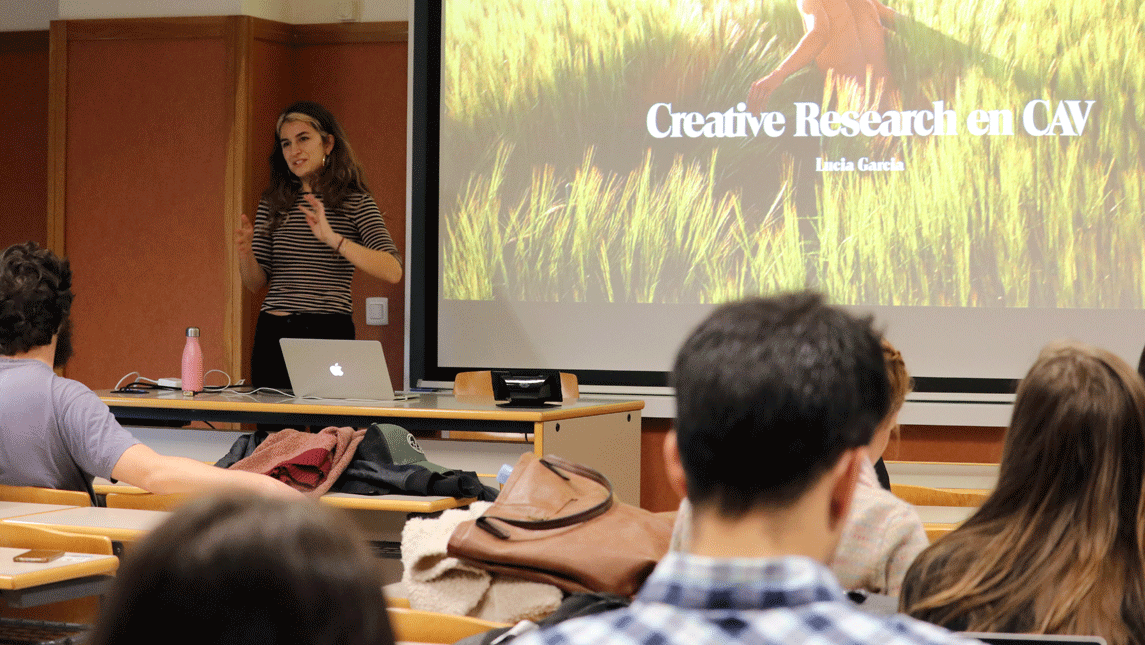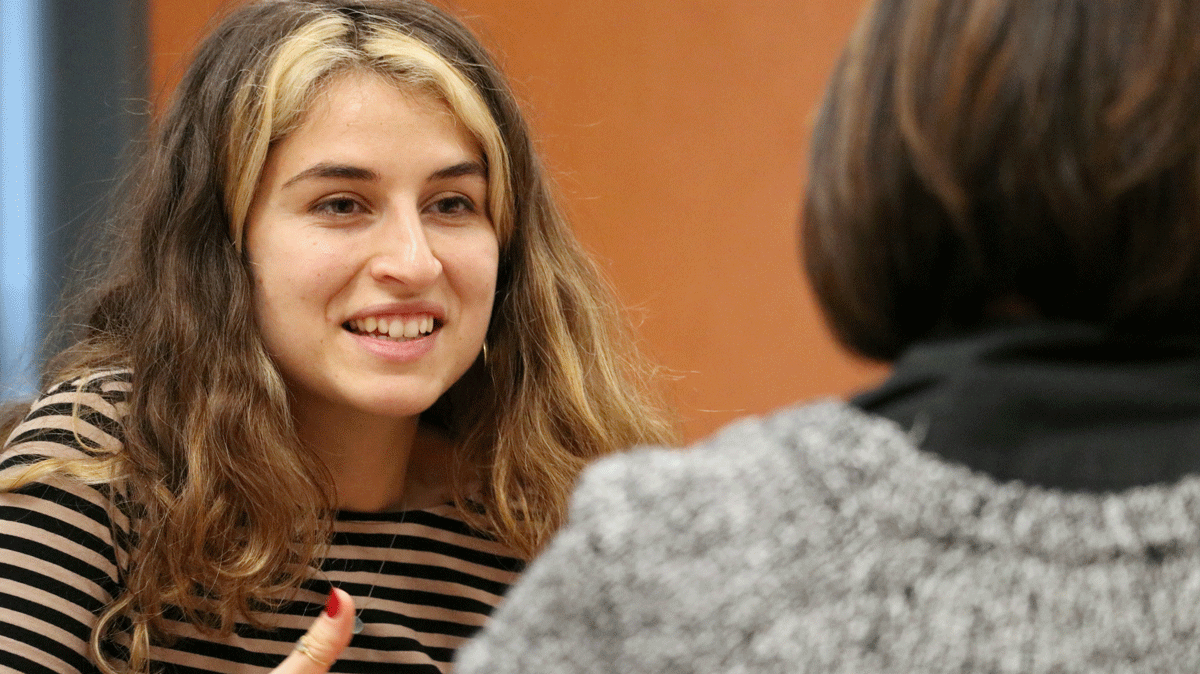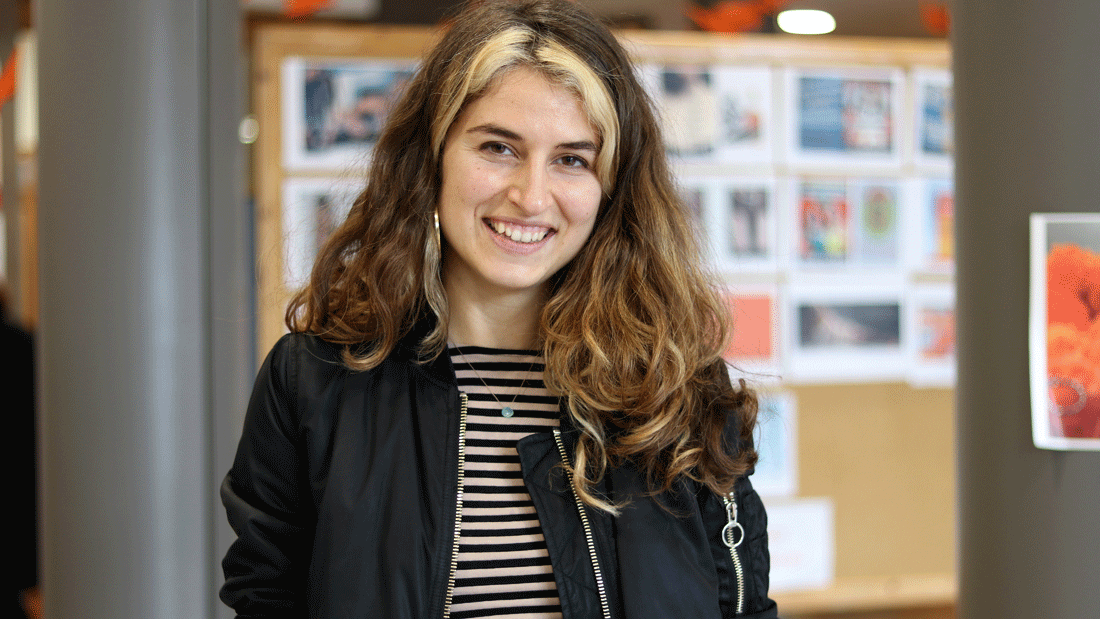She loves London and British culture. She’s a devotee of typography and design. She’s a fan of big brands like Adidas and Nike, of great directors and of great artists. And there’s much more to Lucía García, who graduated five years ago from the dual degree program in Audiovisual Communication and Advertising. After finishing her studies, she moved to London to make her dream a reality: to work with the biggest and best.
She’s currently a creative researcher at the well-known production company Pulse Films. As part of her work there, she meets with directors, producers and artists and helps them to visualize their ideas for their projects on the basis of research in visualization and treatment design. The added value she provides is such that she has achieved here dream of working with the big brands and also with world-class artists such as Beyoncé. She has left her unique creative stamp on all the work she has participated in.
She recently came to Valencia to visit the University and to give a lecture to students following the same path as her. We didn’t want to miss out on this opportunity to ask her about her day-to-day work and also how she is able to use the skills and habits she picked up at CEU.

What led you to go to London?
I’ve always been fond of British culture, especially London. While I was doing my degree at CEU, I used to go to London in the summer to do work experience. I’d get there and look for somewhere to work. I worked for free and very hard.
That helped me to build a network of contacts and to get to know the London-based industry better, which, by the way, is very different to what you see in Spain.
AT THAT TIME, I WAS A STUDENT and getting that experience at these companies helped ME to learn what ‘treatment’ was all about, what directors and agencies were looking for and also to understand what a WORkFLOW was.
My dream was to work with the top directors and to be in contact with the people I saw in Vimeo and YouTube. That’s easy to do in London, as I’m just an email or a coffee away from being able to speak to this or that person, director or brand that I’d always loved.
Tell us about your current role.
Right now, I’m working at a production company with offices in Los Angeles, New York, Berlin and Paris, but the biggest office is in London, which is where I’m based. I’m the manager of my own research team. The LA office has a similar team to ours, performing the same kind of work, but obviously with different working hours. Working together, the two teams constitute a “treatment machine”, working 24 hours a day, because we’re working on the same treatments for the same directors – we do it in the morning and they do it at night.
How a treatment machine in London works
How does that work? What’s a normal day like for you?
My first task is to go through all my emails. I’ll have received a lot of messages over the course of the night from my colleagues at the LA office and I have to deal with them. After that, I organize the work that we need to do, assigning tasks to my team members and myself.
If we have to develop a new treatment, I look for the right profile to develop. That’s where the research element of our work comes in, as we try to get a deeper insight into the brand and director we’re working with. We look for the right images, we speak to the director, we show our work to get some feedback and we keep on progressing with the treatment.
I’m also in charge of supervising all the work and ensuring that everything is just right. If a mistake has been made or a colleague has not done their work properly, I try to understand the problem better to find the right solution. Sometimes, we need to bring in a freelancer to undertake a specific task.
A DAY IS EIGHT OR NINE HOURS OF INTENSE WORK, BUT THERE’S A GREAT ATMOSPHERE.
What brands do you typically work with?
We work with all kinds of brands in different industries. Brands include companies in the car, food, fashion, cosmetics, or life insurance industries, banks, NGOs, etc. We have a lot of projects with McDonald’s, Toyota, Volkswagen, Audi, Nike, Adidas, Levi’s, etc.
I also work with TV channels such as the BBC or Channel Four and with well-known artists, because we also make music videos. For example, we’ve worked with Beyoncé, amongst other people.
Training your eye to look for beauty

Tell us about a habit you picked up at the University which you still do today.
Looking for sources of inspiration.
“YOU NEED TO SHOW CURIOSITY IN ALL THE CONTENT THAT’S OUT THERE, BUT YOU ALSO NEED TO PAY ATTENTION TO OTHER ARTISTS, OTHER DIRECTORS, AND OTHER SOURCES.”
As part of the Audiovisual Communication degree, for example, we were shown lots of films which gave us great knowledge of other periods of time.
My love for photography and also typography began at the University. This is the place where I learnt to train my eye. I remember an idea that Pepe talked about in class: you need to train your eye and it’s a lifelong thing, because as soon as you stop doing it, you start to lose that edge. If you train your eye properly by looking at beautiful things, then in your work you’ll always be attracted to what is beautiful and you’ll be able to distinguish what is good from what is not.
WHEN YOU TRAIN YOUR EYE BY LOOKING AT BEAUTIFUL THINGS, IN YOUR WORK YOU’LL ALWAYS BE ATTRACTED TO WHAT IS BEAUTIFUL AND YOU CAN DISTINGUISH WHAT IS GOOD FROM WHAT IS NOT.
Tell us five things that you learnt at the University that you still find useful in your day-to-day work.
- To be organized, because we’ve got so many files that it’s really important for me to have our material properly classified.
- To aspire always to excellence in your work, to always produce the best.
- To look always for the best in people because you’re going to work with all kinds of personalities and you can always learn from all of them.
- To work hard on your portfolio because that’s what’s going to get your foot in the door.
- To work hard because a role like mine doesn’t just fall into your lap when you graduate. The days are long and hard and you may not be able to go anywhere on holiday for several months, because you have to finish the project you’re working on. But it’s worth it in the end!
Dual degree for a greater perspective
What has studying a dual degree given you?
A lot, because my current role is a nexus between the two industries. I can grasp the position both of the client and the director and understand the tensions between the two. I have to find that balance between them to ensure they both reach their objective.
I CAN SEE THE POSITION BOTH OF THE CLIENT AND THE DIRECTOR AND UNDERSTAND THE TENSIONS BETWEEN THE TWO
After five years away from the University, you’ve come back to teach a lecture to our current students. How do you see the University now? What changes have there been?
I’ve really enjoyed coming back. The Hub here is something that has surprised me. I’ve also heard about the international students here now and I was really taken aback by that. My jaw dropped when I heard you have 2500 international students! There were some before, but only a few, maybe two or three Erasmus students, but I’m amazed there are so many now.
Another thing that caught my eye was the huge building next to the Dentistry Clinic, where the car park used to be. I didn’t know that that was the Faculty of Health Sciences.
Lucía García in the foyer of the Faculty of the Humanities and Communication Sciences.

What advice would you give to those students who’ll soon be be joining the job market?
I’d recommend that they take full advantage of these facilities. The fact that the University has five or six recording studios and photography labs gives them a great opportunity to practise their skills and to develop as a professional. In fact, I would say that I regret not having used the photography labs more. The facilities are incredible and you don’t find them everywhere you go!
I’d also advise them to cultivate strong relationships with the lecturers because they’re the ones who’ll always help you and advise you regarding whatever you need, even if you’re no longer at the University.
Finally, it’s good to have curiosity, to be inquisitive and to investigate. It’s OK to always have your hand up in class, because that way you’ll have more information about what’s being talked about.
Thank you so much, Lucía for telling us about your experience. Keep going and keep making your dreams come true.
If you want to read more stories about the careers of our graduates, click here.
If you enjoyed this, why not share it?












